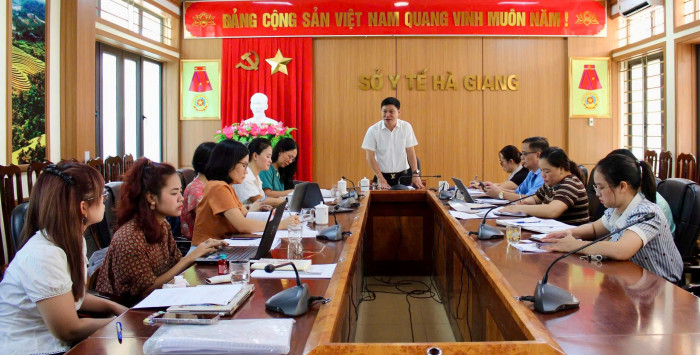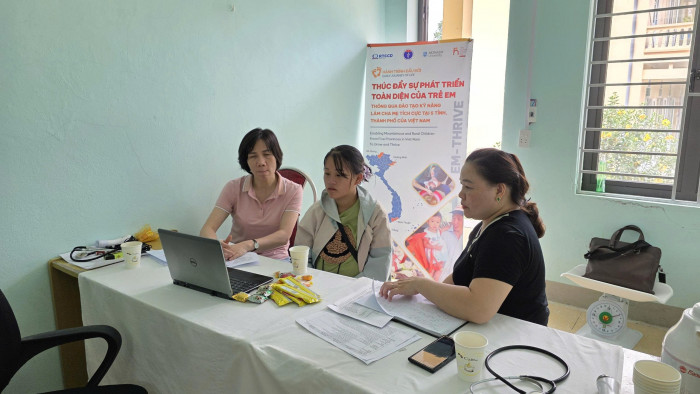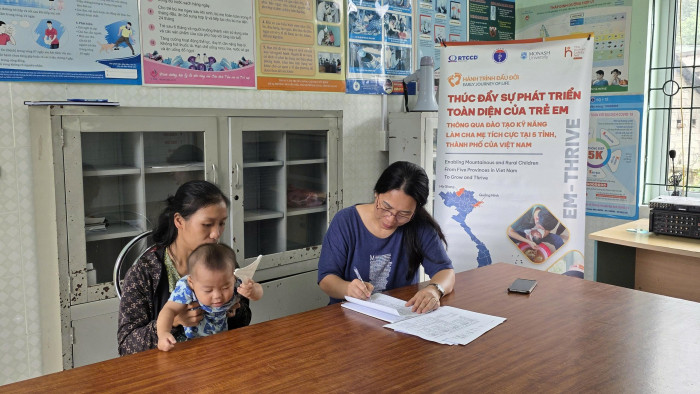On August 13, 2025, the Research and Training Center for Community Development (RTCCD) held a high-level consultation with the Tuyen Quang Department of Health, the Provincial Center for Disease Control (CDC), and the Provincial Radio and Television Station. Discussions centered on introducing the Early Journey of Life (EJOL) Program [1], exploring sustainable implementation strategies, and fostering cross-sectoral collaboration to improve care and development for ethnic minority children during their first 2,000 days of life.
1. Strong Support from Health Leaders for EJOL
Health leaders commended the EJOL program for its practicality and humanity. A senior representative of the Department of Health affirmed:
“The program’s interventions are both relevant and community-centered. They can be easily integrated into routine immunization sessions at village posts and commune health stations. This approach aligns perfectly with the Party’s direction of prioritizing quality healthcare services for ethnic minorities and remote areas.”
CDC leaders emphasized existing gaps despite ongoing maternal and child health programs, particularly in early childhood education, responsive caregiving, and maternal mental health. They also highlighted the need to strengthen father involvement:
“Fathers love their children, but often do not participate in caregiving. We need to shift the perception—being a caring father should be seen as admirable, not as weakness.”
The Provincial Radio & Television Station confirmed its readiness to cooperate, pledging to produce content in H’Mong and Dao languages and broadcast through wireless village loudspeakers—an especially effective communication channel in mountainous regions.
2. Agreed Roadmap for Community-Based Implementation
The consultation outlined clear steps to bring EJOL directly to families:
-
Training of Trainers (TOT): Core trainers from the CDC, provincial hospitals, and immunization centers will be engaged.
-
Commune-level training: Two health staff from each commune and village health workers will join a blended program (online + two-day in-person). Village health workers will directly coach parents and grandparents, with commune health staff providing technical support.
-
Practical caregiver training:
-
Pregnant women and husbands will attend two initial group sessions at the village level.
-
Parents and grandparents will learn lessons 3–12 during routine immunization visits.
-
Grandparents will receive two dedicated annual sessions at village cultural houses focusing on early education, praise, communication, and reducing screen use.
-
3. Creative Incentives to Boost Community Participation
To encourage adoption, the program and provincial health sector introduced several strategies:
-
Monthly Zalo community groups to share lessons and provide online counseling.
-
Family competitions (father–child, mother–child, grandparent–grandchild) with short video submissions, prizes including books, stories, and toys.
-
Collaboration with the agricultural sector to promote household vegetable and fruit gardens for healthier child meals.
-
Development of an e-course in ethnic minority languages, scheduled for launch in 2026.
4. Scaling Up and Cross-Sector Collaboration
Following administrative restructuring, 20 pilot communes now cover the equivalent of 60 former communes. The Department of Health committed to tailored support, while provincial leaders proposed involving preschool teachers—who spend substantial time directly caring for children in mountainous areas.
The Provincial Radio & Television Station agreed to broadcast EJOL videos monthly across the province. Meanwhile, the Department of Health will work with the Provincial People’s Committee and People’s Council to secure budget allocations for commune health stations and sustain village health workers, the frontline agents of EJOL.
Although EJOL has received official guidance from the Ministry of Health’s Department of Maternal and Child Health, further alignment with the National Expanded Immunization Program is needed to ensure sustainable implementation and measurable outcomes.
5. Next Steps (2025–2026)
-
August 2025: Finalize program script and sign cooperation addendum.
-
September–November 2025: Film and produce videos with H’Mong, Dao, and Nung communities.
-
December 2025 – January 2026: Conduct TOT training and roll out at 20 commune health stations.
-
January 2026: Hold a provincial leadership conference with participation from the Ministry of Health.
A Strong Commitment to Children’s Future
The consultation at Tuyen Quang Health Department (former Ha Giang facility) marked a turning point with concrete commitments from health authorities, media, and local government. With inter-sectoral collaboration and strong community involvement, the Early Journey of Life Program will not only equip parents and grandparents in remote areas with essential skills and knowledge, but also build policy foundations to ensure that every child—whether born in remote villages or in urban centers—receives a fair, healthy, and happy start in life.
Visit the Early Journey of Life website for more information: https://ejol.vn/ [1]


